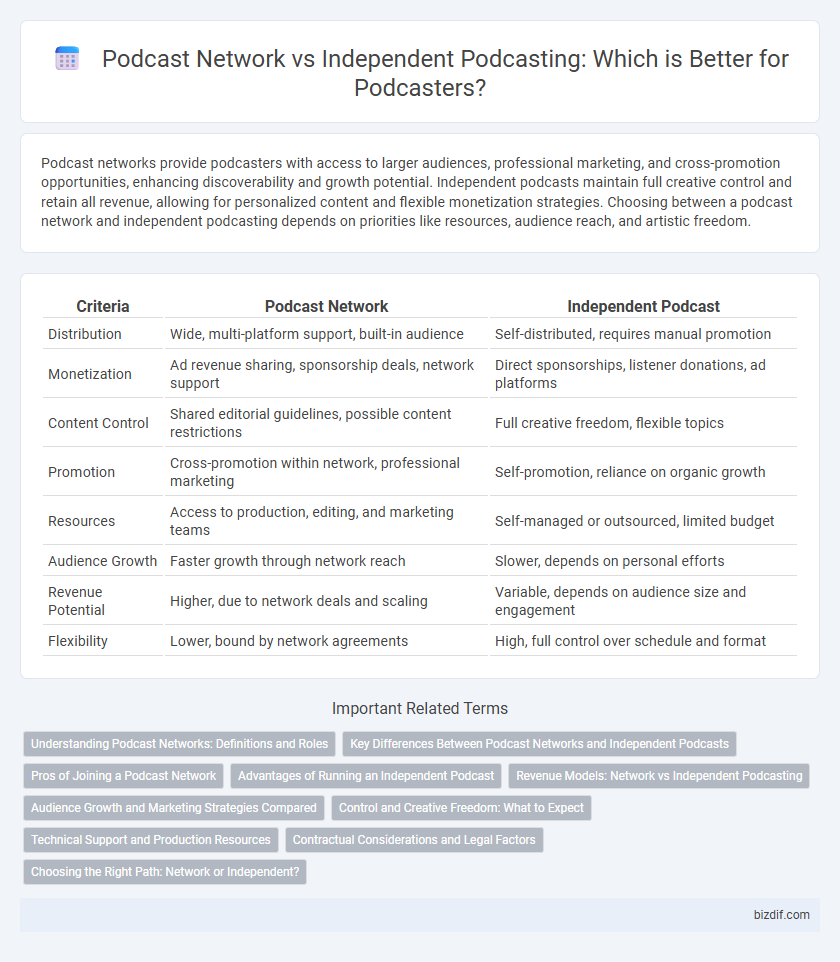Podcast networks provide podcasters with access to larger audiences, professional marketing, and cross-promotion opportunities, enhancing discoverability and growth potential. Independent podcasts maintain full creative control and retain all revenue, allowing for personalized content and flexible monetization strategies. Choosing between a podcast network and independent podcasting depends on priorities like resources, audience reach, and artistic freedom.
Table of Comparison
| Criteria | Podcast Network | Independent Podcast |
|---|---|---|
| Distribution | Wide, multi-platform support, built-in audience | Self-distributed, requires manual promotion |
| Monetization | Ad revenue sharing, sponsorship deals, network support | Direct sponsorships, listener donations, ad platforms |
| Content Control | Shared editorial guidelines, possible content restrictions | Full creative freedom, flexible topics |
| Promotion | Cross-promotion within network, professional marketing | Self-promotion, reliance on organic growth |
| Resources | Access to production, editing, and marketing teams | Self-managed or outsourced, limited budget |
| Audience Growth | Faster growth through network reach | Slower, depends on personal efforts |
| Revenue Potential | Higher, due to network deals and scaling | Variable, depends on audience size and engagement |
| Flexibility | Lower, bound by network agreements | High, full control over schedule and format |
Understanding Podcast Networks: Definitions and Roles
Podcast networks are organizations that aggregate multiple podcasts under a single brand, offering creators resources like marketing, monetization, and technical support to scale their audience. Independent podcasts operate outside these networks, retaining full creative control and ownership but often facing challenges in distribution and funding. Understanding the roles of podcast networks clarifies how they facilitate growth and professionalization in the podcasting landscape.
Key Differences Between Podcast Networks and Independent Podcasts
Podcast networks provide centralized resources such as marketing, distribution, and monetization opportunities, which independent podcasts typically manage individually. Independent podcasts maintain full creative control and flexible content choices without external constraints or revenue sharing. The scalability and audience reach of podcast networks often surpass independent podcasts due to pooled resources and cross-promotion across multiple shows.
Pros of Joining a Podcast Network
Joining a podcast network provides access to professional marketing, broad audience reach, and monetization opportunities that independent podcasts often struggle to achieve. Network affiliation enables collaboration with experienced producers, enhanced distribution channels, and shared resources such as advertising deals and technical support. These advantages accelerate growth, improve content quality, and increase revenue potential compared to solo podcasting efforts.
Advantages of Running an Independent Podcast
Running an independent podcast offers complete creative control, allowing hosts to tailor content without external restrictions and build a unique brand identity. Independent podcasters retain full ownership of their episodes, monetization strategies, and audience engagement, leading to higher revenue potential per episode. Freedom from network schedules or advertising mandates provides flexibility in publishing frequency and sponsorship choices, fostering authentic connections with a dedicated listener base.
Revenue Models: Network vs Independent Podcasting
Podcast networks generate revenue primarily through advertising partnerships, sponsorship deals, and cross-promotion, leveraging collective audience size for higher ad rates. Independent podcasts rely on diversified income streams such as listener donations, merchandise sales, crowdfunding platforms like Patreon, and direct sponsorships tailored to niche audiences. Network affiliation often stabilizes cash flow, while independents maintain full control over monetization but may face inconsistent revenue.
Audience Growth and Marketing Strategies Compared
Podcast networks leverage collective marketing efforts and cross-promotion among popular shows, accelerating audience growth more effectively than independent podcasts. Independent podcasters often rely on organic growth through social media engagement, niche communities, and personal branding to build a loyal listener base. Marketing strategies in podcast networks benefit from shared resources and advertising budgets, while independent creators must optimize SEO and local outreach to maximize visibility.
Control and Creative Freedom: What to Expect
Podcast networks typically offer structured support, marketing resources, and audience access, but they often require content guidelines and may limit creative freedom to maintain brand consistency. Independent podcasts maintain full control over content, style, and publishing schedules, allowing for complete creative freedom without external restrictions, but they often lack the promotional and financial support that networks provide. Choosing between a podcast network and independent podcasting hinges on balancing creative autonomy with the benefits of shared resources and exposure.
Technical Support and Production Resources
Podcast networks offer extensive technical support and access to high-quality production resources, including professional editing, sound engineering, and distribution platforms, which can significantly enhance podcast quality. Independent podcasters often manage these aspects themselves, relying on basic tools and personal expertise, which may limit production value and audience reach. Access to a podcast network's infrastructure reduces technical challenges and accelerates content delivery, enabling creators to focus on content rather than production logistics.
Contractual Considerations and Legal Factors
Podcast networks often require creators to enter contracts that outline content rights, revenue sharing, and exclusivity clauses, providing legal protection and structured monetization. Independent podcasters maintain full control over their content and distribution but must navigate intellectual property rights, licensing, and sponsorship agreements independently. Understanding contract terms, copyright law, and liability implications is crucial for both models to protect content and ensure compliance.
Choosing the Right Path: Network or Independent?
Choosing between a podcast network and independent podcasting depends on goals and resources; networks offer built-in audiences, marketing support, and monetization options, while independent podcasts retain full creative control and higher revenue potential. Networks provide collaboration opportunities and streamlined distribution but may require content alignment and revenue sharing, contrasting with the autonomy and flexibility independent creators enjoy. Evaluating audience reach, brand partnerships, and personal vision ensures the best fit for long-term podcast success.
Podcast Network vs Independent Podcast Infographic

 bizdif.com
bizdif.com